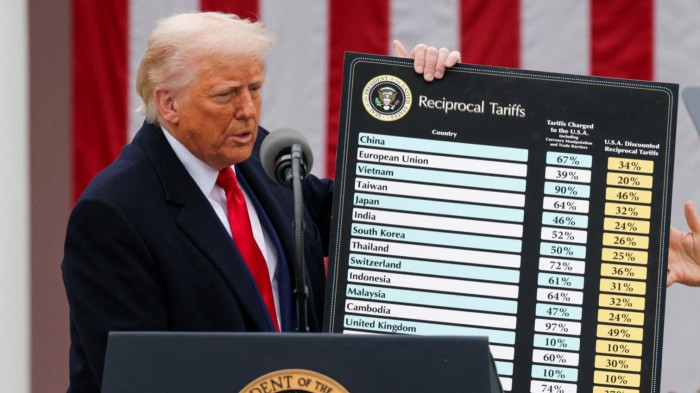Unlock the Editor’s Digest for free
Roula Khalaf, Editor of the FT, selects her favourite stories in this weekly newsletter.
The writer is an FT contributing editor, chief economist at American Compass and writes the Understanding America newsletter
A notable feature of the latest US-China trade détente is the Trump administration’s apparent commitment to the 10 per cent global tariff as a permanent baseline. The common but peculiar objection to the president’s ongoing tariffs is that the burdens they place on so-called intermediate goods are self-defeating. Put a tariff on steel and the domestic steelmaker might benefit, but the many more manufacturers that use steel will suffer. More broadly, tariffs on inputs reduce the “competitiveness” of outputs in the global marketplace. Tariff the iPhone, if you must, but not its chips and screws and screen.
The error contained in this critique is the same one that free-traders have been making for a generation: imagining a global economy that operates like the friendly free market on the economist’s blackboard in which competitors sharpen one another and capital flows to its best use. Productivity rises, prices fall, everyone flourishes.
In the real world, by contrast, the global marketplace is dominated by government-built national champions. Capital flows towards the biggest subsidies and the most exploitable labour. Productivity falls, in the US anyway, where the typical factory requires more labour than a decade ago to produce the same output.
The free-trader is nostalgic for a bygone era when a developing country could offer its labour at a discount, subsidise its producers, and sell the resulting output to wealthier customers in other places. That model of “export-led growth” generated extraordinary increases in prosperity and depended above all on cheap inputs. Taxing those would have been senseless.
This export-led path is not open to the US today. Tariff the steel, don’t tariff the steel — in neither case will US automakers have success selling American-made cars in foreign markets. Tariff the chips, don’t tariff the chips — in neither case will American-made iPhones reach Chinese shelves.
The theoretically elegant model of “comparative advantage”, whereby trading partners both benefit by each specialising where it is relatively more productive, ceased to function as soon as the export-led fad began. The US trade balance in advanced technology products fell from a nearly $100bn surplus (in 2025 dollars) at the end of the cold war to a $300bn deficit last year. Taiwan is not the world’s leading chipmaker because its beaches teem with silicon.
Fortunately, the US is not a small developing country. Its domestic consumer market is by far the world’s largest, and its imports exceed its exports by more than $1tn annually. American manufacturers could have years, perhaps even decades, of growth ahead merely from winning share in the American marketplace. And there, a tariff does not reduce competitiveness.
A global tariff rewards US manufacturers in their domestic marketplace in precise proportion to the degree they source and produce at home. It rewards foreign producers precisely to the degree they relocate production into the US.
Consider the example of Taiwan Semiconductor Manufacturing Company (TSMC), now building leading-edge chip factories in Arizona. A 10 per cent global tariff makes those factories less competitive, say critics, because some of the materials and equipment must be imported. TSMC must pay 10 per cent more for those inputs in Arizona than it pays in Taiwan.
So what? Arizona-made chips will not be competing with Taiwan-made chips in the “global marketplace”. They will be absorbed by US demand. And thanks to the global tariff, that Arizona plant will begin looking for domestic inputs.
A more valid concern would be that a US market insulated in this way will become sclerotic. Of course, closing the trillion-dollar trade deficit would still mean trillions of dollars in annual imports — hardly autarky. And the US, when its market was much smaller and trade volumes much lower, spawned most of last century’s major innovations. Progress has been much worse in the globalised era when free trade undermined the free market.
The bet on tariffs is that the free market, even at more limited domestic scale, can deliver better outcomes than a global market dominated by state-subsidised national champions. Perhaps the free-traders are betting on the latter, and would abandon American-style capitalism altogether before allowing so blasphemous a word as “protection” to pass their lips. What they cannot have in the modern world, no matter how ideal in theory, is free trade and a free market at the same time.
What the US-China superpower showdown means for the world: join a webinar for FT subscribers on 28 May 1200-1300 BST/GMT+1 and put your questions to the FT’s Gideon Rachman, Eleanor Olcott plus guests Oren Cass and Janka Oertel. Register now at ft.com/us-china


